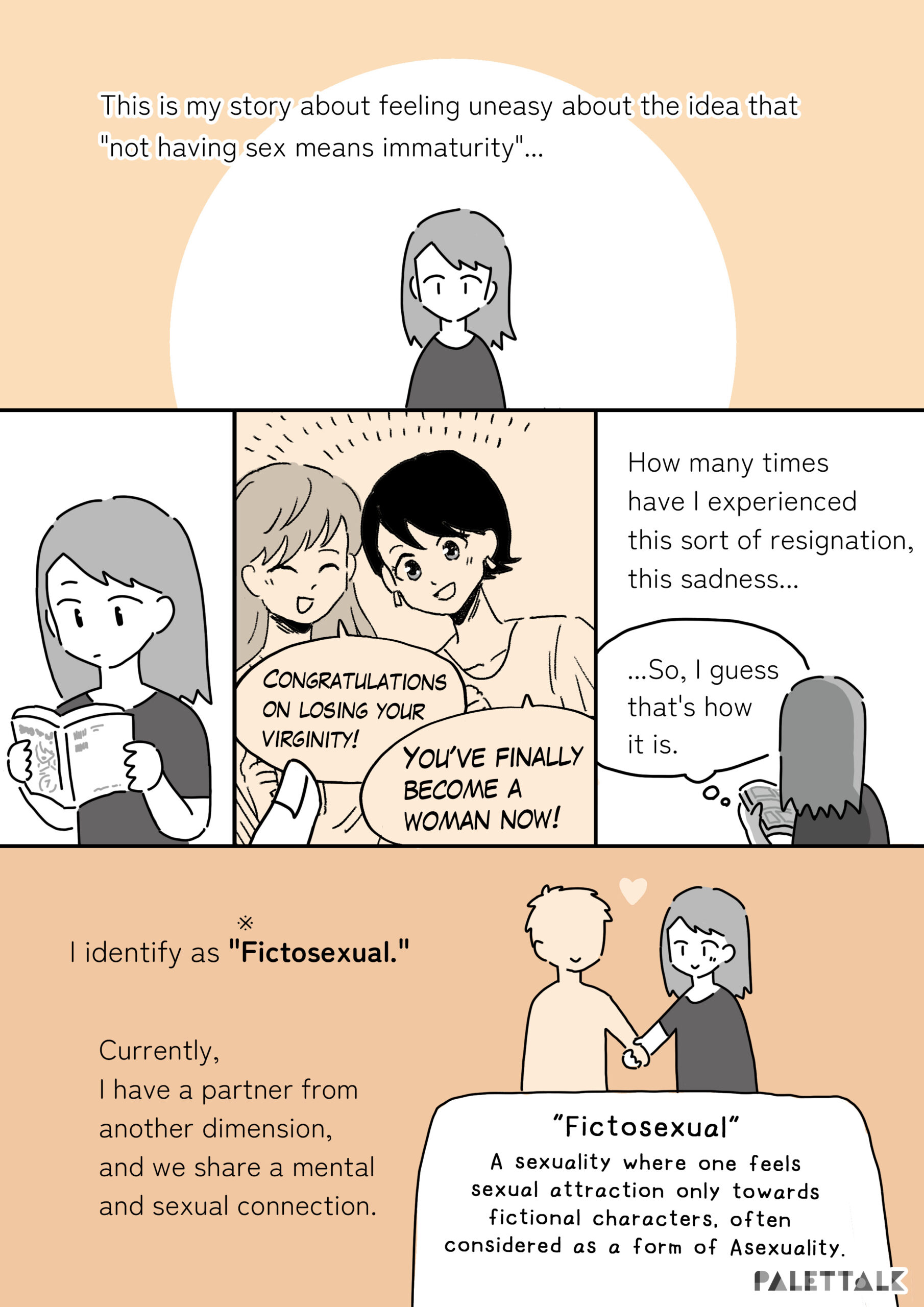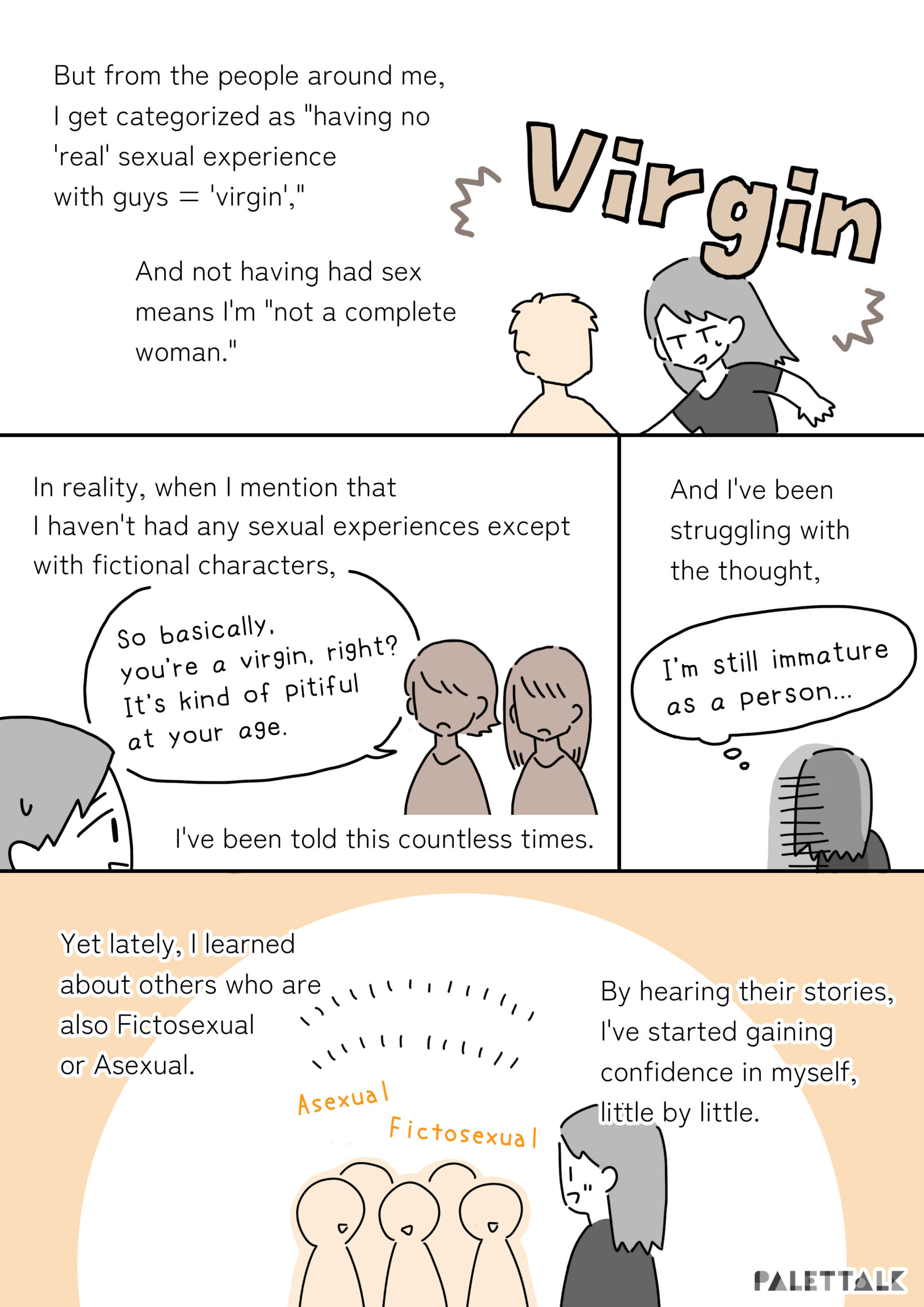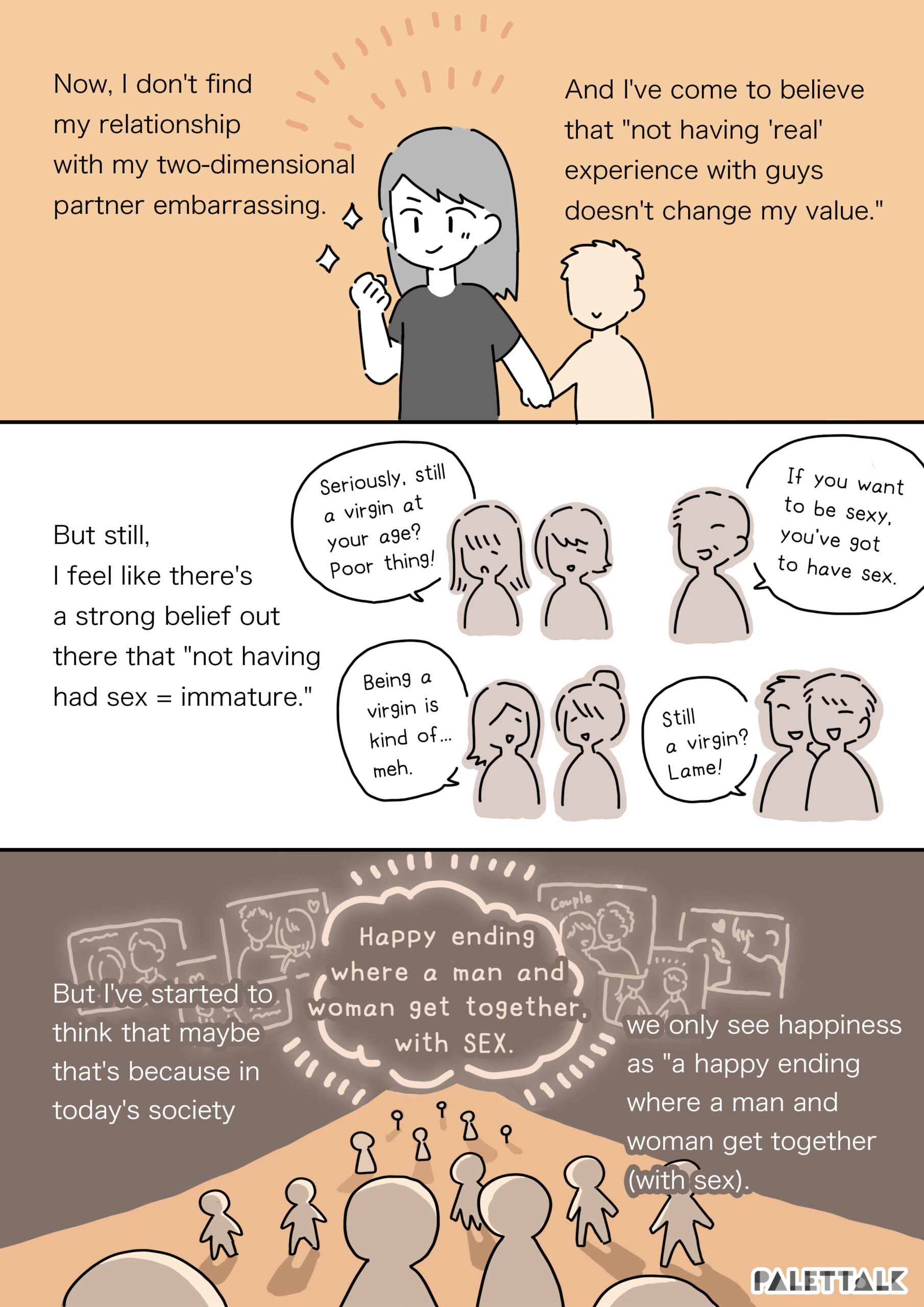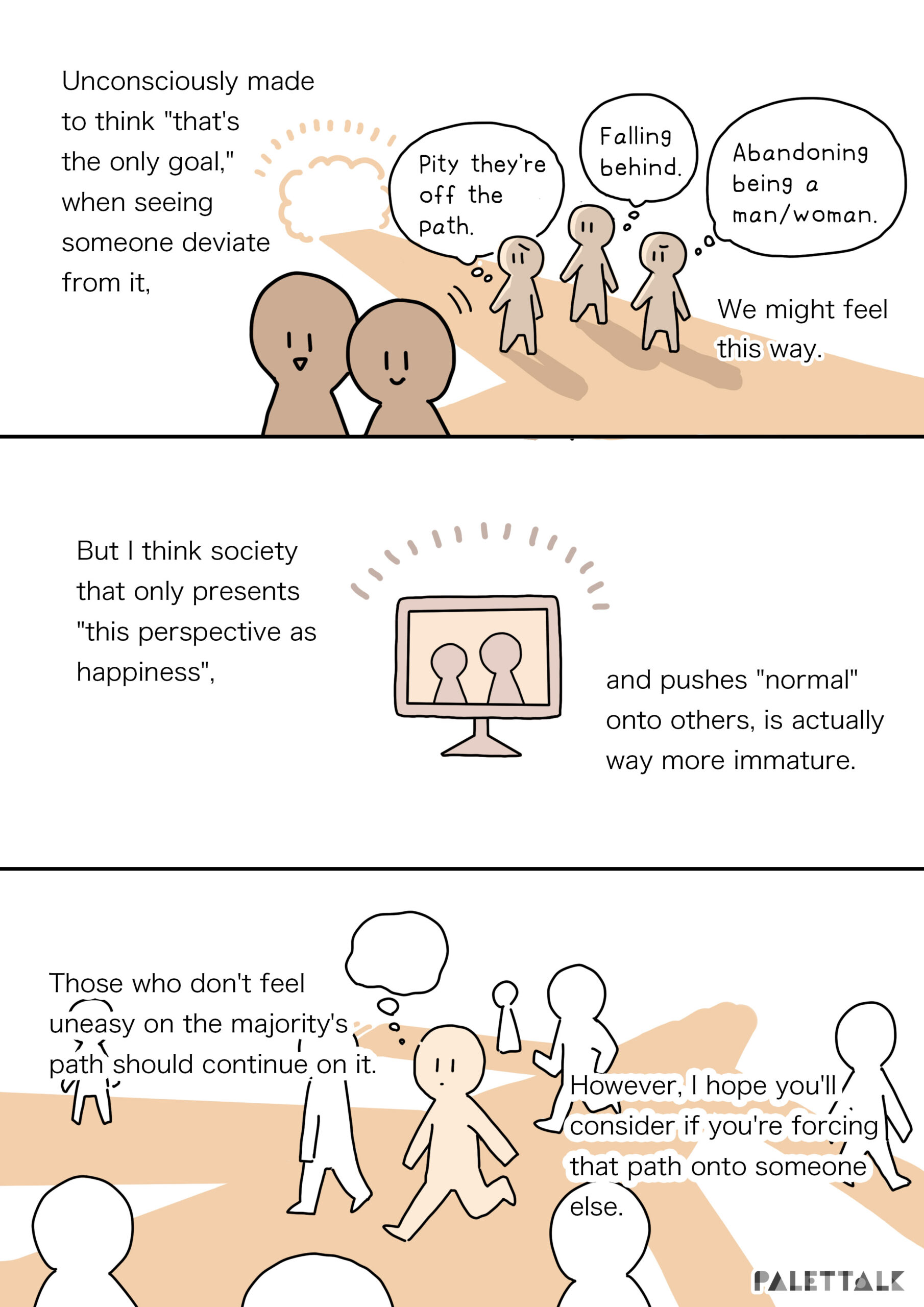【Manga】My Story of Being Bothered by the “Have Sex and Be One” Trend.
“Congratulations on your virginity.” “Are you still a virgin?”
Have you ever heard or come across words like these?
Even if you haven’t personally said or heard them, you might have seen them in manga, anime, or dramas at least once.
When you lack experience with sex, the word “virgin” is often used to praise your purity, or to mock your inexperience and portray you as undesirable.
The decision to have sex or not is a private matter within each intimate relationship, and what someone does with their body should be respected as their own choice.
However, why has the pressure from outsiders to engage in (penetrative) sex become so common, even though it should be a personal decision?
In this discussion, We would like to question this notion of “You’re not grown up until you have sex” through manga featuring characters who identify as fictosexual.
What is Fictosexual?
Fictosexual is a term used to describe a sexuality where someone experiences sexual attraction towards fictional characters.
Among those who identify as fictosexual, some individuals feel sexual attraction to both fictional characters and real individuals, while others feel no sexual attraction towards real individuals at all.
Because of this, fictosexuality can also be considered part of the broader category of Asexuality.Furthermore, a sexuality that involves feeling romantic attraction to fictional characters is known as “Fictoromantic.”
Is Having Sex a Requirement to be Considered Mature?
Some people might feel that their lives have changed after having sex. There are those who experience great pleasure from sex itself or learn things through sexual experiences with others.
However, it seems hasty to conclude that sex is the only path to happiness or to label those without experience as immature.
To begin with, when talking about virgins and virgins, the idea that “sex = penetration” is assumed, However, there is no correct way to have sex, and penetration is only one of the many ways to have sex. As I mentioned at the beginning of this article, there are many ways to have sex. As I mentioned at the beginning of this article, It is up to the individual to decide what to do with his or her own body, and what kind of intimacy (or not) to have should not be dictated by a third party. I think it’s a good idea to have a third party to say what to do with your body.
Now, I’d like to share an analogy.
Person A got matching tattoos with their partner.
After longing for tattoos, Person A finally got them and felt more mature both mentally and physically. Talking about tattoo designs with their partner and trying things together helped them learn more about each other and strengthen their relationship.
Now, what if Person A said, “Those who haven’t gotten matching tattoos are emotionally immature as humans” or “Relationships without matching tattoos are just playing at love”? How would you feel about that?
You might feel uncomfortable, thinking, “A is imposing their standards on others.”
The happiness Person A derives from getting matching tattoos with their partner shouldn’t be denied by anyone.
However, just because Person A feels that way doesn’t mean everyone wants tattoos. Moreover, if they were to get matching tattoos as a couple, their partner’s consent would be essential.
In today’s Japanese society, the idea that “getting matching tattoos is normal” isn’t widespread. So, you probably easily recognize the absurdity in judging someone’s maturity or relationship quality based on the presence of tattoos.
Yet, when it comes to sex, it’s not that simple.
As portrayed in manga, in a society where being “normal” means being sexually attracted to someone (in the three-dimensional sense), sex (specifically vaginal penetration) is excessively emphasized, and imposing those values becomes prevalent.
The idea that “normal” people naturally feel sexually attracted to others, and using this idea to enforce participation in sexual activities, has been criticized by the Asexual community through movements and research focused on Asexuality.
Next, I’ll introduce the concept of “sexualnormativity,” which emerged from such activities.
What is “Sexualnormativity”?
“Sexualnormativity” refers to the norm that links experiencing sexual attraction with “maturity” or “health” as a person and considers sex more important in couple relationships, love, and intimacy than any other connection or interaction.
This concept was coined by altering the term “heteronormativity,” which implies that heterosexuality is “normal” and “natural,” while homosexuality is “abnormal” and “deviant.”
Just as the concept of heteronormativity makes us realize that heterosexuality has been assumed, even though not everyone is heterosexual, sexualnormativity brings us awareness that even though not everyone experiences sexual attraction, feeling sexually attracted is presumed, and participation in sex is forced.
Asexual individuals living in a sexualnormative society, for example, experience being treated as “abnormal” in various situations every day.
For instance, even if they are content with their sexuality, they might be labeled as having something “wrong” by others or made to doubt their own perception with statements like, “Maybe you just haven’t met the right person yet.” Sometimes, they might even be accused of repressing sexual desires that “everyone should naturally have.”
In this manner, sexualnormativity has created an atmosphere that treats asexual individuals, as well as people who don’t engage in sexual activities, those who are indifferent to sexual matters, and those who have relationships different from societal norms, as “unnatural beings,” leading to their exclusion.
Recently, little by little, such a society has come to be questioned.
Remember That “Experiencing Sexual Attraction Isn’t Always Normal.”
There is often a negative image associated with sexual interest and desire, and advocating “don’t repress desires” holds significant meaning, especially in a country where comprehensive sex education for children is met with backlash, akin to “don’t wake a sleeping child.”
Additionally, speaking out with “Our sexual desires cannot be denied by anyone” is an essential action to combat the stigma that’s imposed on sexual desires outside of heterosexual relationships. It’s a step toward gradually changing a world centered around heterosexuality.
However, amidst these movements, it’s important not to forget that some people are invalidated when phrases like “experiencing sexual desire is a normal part of being human” are used.
The consciousness of “not assuming heterosexuality” seems to have considerably spread compared to the past.
However, the assumption that “everyone will inevitably experience the desire to have sex with someone” and the belief that “sexual experiences make people mature” still linger.
As portrayed in manga, if you don’t feel discomfort with the “mainstream” way of living, you’re free to continue living that way.
Nevertheless, while believing in these “normal” values, it’s crucial to reflect at least once on whether you are unconsciously imposing them on others.
(Text: Saki Yoshimoto, Translation: Jennifer Martin)





